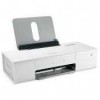Lexmark Z1420 Getting Started - Page 40
Check MAC address, Ping the wireless access point wireless router to make sure the network is working - wireless not working
 |
UPC - 734646022750
View all Lexmark Z1420 manuals
Add to My Manuals
Save this manual to your list of manuals |
Page 40 highlights
Move your wireless access point (wireless router) to minimize interference There may be temporary interference from other devices such as microwave ovens or other appliances, cordless phones, baby monitors, and security system cameras. Make sure your wireless access point (wireless router) is not positioned too closely to these devices. Try adjusting external antennas Generally, antennas work best if they are pointing straight up. You may find, however, that reception improves if you experiment with different angles for your printer and/or wireless access point (wireless router) antennas. Move your computer and/or printer Move the computer and/or printer closer to the wireless access point (wireless router). Although the possible distance between devices in 802.11b or 802.11g networks is 300 feet, the effective range for optimal performance is generally 100-150 feet. You can find the signal strength of the network on the network setup page. For information on how to print a setup page, see "Printing a network setup page" on page 36. Check security keys Make sure security keys are correct. For more information, see "Check your security keys" on page 38. Check MAC address If your network uses MAC address filtering, provide the MAC address for the printer to your network. If you need help finding the MAC address, see "Finding your MAC address" on page 50. Ping the wireless access point (wireless router) to make sure the network is working Windows users only 1 If you do not already know it, find the IP address of the access point. a Click: • In Windows XP: Start Œ Programs or All Programs Œ Accessories Œ Command Prompt • In Windows Vista: The Start icon Œ All Programs Œ Accessories Œ Command Prompt The Start icon looks like . b Type ipconfig. c Press Enter. • The "Default Gateway" entry is typically the wireless access point (wireless router). • The IP address appears as four sets of numbers separated by periods, such as 192.168.0.100. Your IP address might also start with the numbers 10 or 169. This is determined by your operating system or wireless network software. 2 Ping the wireless access point (wireless router). a Click: • In Windows XP: Start Œ Programs or All Programs Œ Accessories Œ Command Prompt • In Windows Vista: The Start icon Œ All Programs Œ Accessories Œ Command Prompt The Start icon looks like . b Type ping followed by a space and the IP address of the wireless access point (wireless router). For example: ping 192.168.0.100 40















